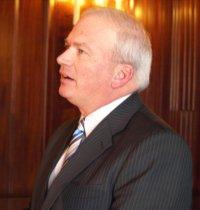Right-to-work legislation, which looks to limit unions’ governing power, is losing pull as a priority issue in Wisconsin’s Legislature this session.
Sen. Scott Fitzgerald, R-Juneau, said in a statement this month he no longer expects right-to-work legislation to be brought up any time soon, a dramatic shift from his earlier statements that he intended to make the movement a priority this session.
The reason for the priority change regarding the legislation, which if passed would take power out of the hands of private sector unions, is likely due to a variety of factors, Barry Burden, University of Wisconsin political science professor, said.
“It’s probably a reflection of different viewpoints within his Republican caucus in the Senate,” Burden said.
He said not only have lawmakers voiced concerns, but Gov. Scott Walker has also expressed he would rather not make “Right to Work” a priority this session. He said Walker would rather focus on the budget, job creation and other issues he sees as being more pressing.
Burden said strategically, Fitzgerald is unlikely to get his entire caucus together and the governor on board. He said it is unclear whether Walker would sign such a bill into law if it were to make it to his desk and might not be necessary in a 2016 presidential bid.
“As a talking point, it seems he can already go to Republican activists and say ‘I took on the unions in Wisconsin and stopped collective bargaining for public employees,'” Burden said.
Burden said that could potentially be a very important point on his side as a candidate and focusing on private sector unions probably would not get him much more recognition nationally.
Burden said most of the states which have right-to-work laws are mostly in the South and the West. These are states where unions have not been very strong historically and have fewer older industries like auto and manufacturing, which are powerful in states like Wisconsin.
“The trend toward right-to-work laws has only recently worked its way into the Midwest,” Burden said.
John Ahlquist, an associate professor in UW’s La Follette School of Public Affairs, said outside groups, like the National Right to Work Committee, have decided to make Wisconsin the next “Right to Work” state.
Right-to-work legislation gaining traction in state legislature
Ahlquist said he tends to view “Right to Work” as a more political fight than about business, as union supporters and members tend to be more democratic.
“It’s an attack on the people who are out of power in Wisconsin right now,” Ahlquist said.
Ahlquist said Walker’s lack of support for “Right to Work” is more strategic than ideological and this hesitation is likely a factor for Fitzgerald’s recent back-down.
He said Walker likely would prioritize “Right to Work” if he had no intentions of a 2016 presidential race.
“I think Walker clearly has presidential ambitions and is trying to position himself to a broader audience,” Ahlquist said.
Ahlquist said Walker’s avoidance of this issue is an attempt to make himself more attractive to independent and even centrist Democratic voters, who would likely not support legislation taking private-sector union power.













